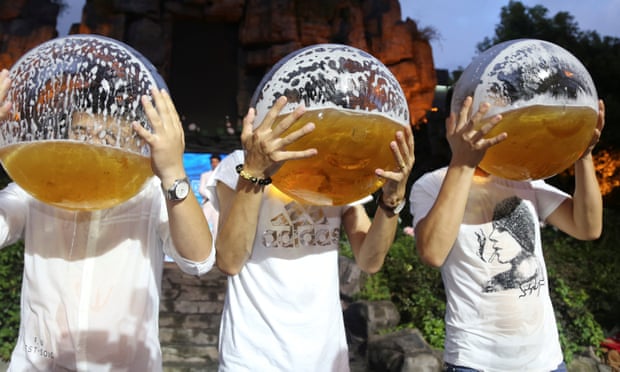- UID
- 20
- Online time
- Hours
- Posts
- Reg time
- 24-8-2017
- Last login
- 1-1-1970
|
|
━━━━━━━━━━━━━━━━━
Chinese will surpass the US for per capita intake by 2030, research shows, but Moldova claims top spot for now.

People at a beer drinking competition in Hangzhou in China. Alcohol intake per head has increased 70% in the country since 1990. Photograph: China Stringer Network/Reuters
▼ The world is consuming significantly more alcohol than 30 years ago thanks in large part to heavier and more widespread drinking in China and India, researchers have claimed.
On current trends, global consumption per capita will rise another 17% over the next decade, they reported in The Lancet, after a 10% rise in drinking between 1990 and 2017 .
By 2030 half of all adults worldwide will drink alcohol, and almost a quarter will binge drink at least once a month, according to projections covering 189 countries.
“The world is not on track to achieve global targets to reduce harmful alcohol use,” the authors said, calling for more aggressive counter-measures such as higher taxes and a ban on advertising.
Globally, some 237 million men and 46 million women suffer from alcohol-related disorders, with the highest rates in Europe (15% and 3.5%, respectively, for men and women) and North America (11.5% and 5%).
“Before 1990, most alcohol was consumed in high-income countries, with the highest use levels recorded in Europe,” said lead author Jakob Manthey, a researcher at the Institute of Clinical Psychology and Psychotherapy in Dresden, Germany.
“However, this pattern has changed substantially, with large reductions across eastern Europe and vast increases in several middle-income countries such as China, India, and Vietnam.”
In 2017 a higher percentage of adults aged 15 and older in Europe and North America still consumed alcohol – and more of it – than in other parts of the world.
In France, for example, men drank the equivalent of 19 litres of pure alcohol, and women just under six, for a combined average of just over 12 litres. (▪ ▪ ▪)
► Please, continue reading this article here: Source |
|